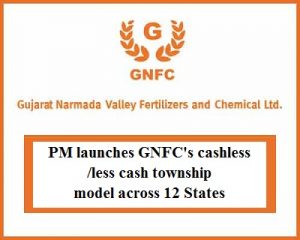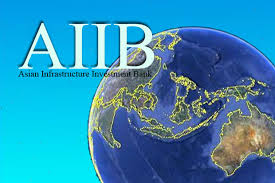On April 14, 2017, during his Nagpur visit, PM Narendra Modi launched a less – cash township model, developed by Gujarat Narmada Valley Fertilizers and Chemicals Ltd (GNFC), across 81 townships in 12 States.
- The less-cash model across the States has been facilitated by GNFC under the auspices of NITI Aayog. It is to be noted that GNFC’s township at Bharuch in Gujarat became India’s first 100 per cent cashless township.
Details of 81 Townships:
56 out of 81 selected townships are in Gujarat, whereas 25 townships are located in other 11 states including Uttar Pradesh, Maharashtra, Delhi, Chhattisgarh, and Bihar. The 81 townships comprise central public sector townships such as ONGC, IOC, NTPC, SAIL, NMDC and BHEL, townships of Central Govt. entities such as CRPF, BSF and Police Lines and private sector townships like Reliance, Essar, Adani, Birla Aditya and Welspun.
Criteria to qualify as ‘Less-Cash’ Township:
To qualify as less-cash townships, all 81 townships were subjected to an independent third party assessment by Price waterhouse Coopers – PwC on below mentioned parameters:
- Availability of required infrastructure to enable digital payments.
- Residents of the township must be covered under training programmes.
- During the assessment period, more than 80% transactions should have been executed through digital mode.
Expected Results:
- Around 2.5 lakh cashless transactions per day, translating into 9 crore cashless transactions in a year will be executed in these townships. This will help to achieve Govt.’s target of 2,500 crore digital transactions for FY 2017-18.
- NITI Aayog has appreciated GNFC’s model of cashless townships and has advised the Central ministries and Heads of 300-plus Central PSUs to adopt this model.
Emerging Trends from Price waterhouse Coopers (PwC’s) study on Impact Assessment of GNFC’s cashless initiative:
PwC’s study on Impact Assessment of GNFC’s cashless initiative has revealed that going cashless has several socio-economic benefits viz. improving financial inclusion, better parental control, women’s empowerment and effective fund management on individual level.
- The study has shown that GNFC’s cashless initiatives has resulted in cost savings, particularly for farmers as they availed discounts on cashless transactions and visited the fertiliser shops less frequently.
- For a typical household which incurs too many small ticket transactions on day to day basis, going cashless is more convenient and also helps in saving time.




